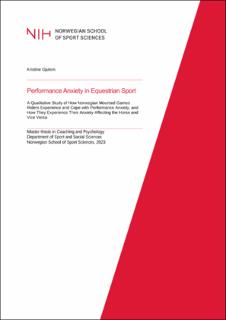| dc.description.abstract | Background: Equestrian sports hinge on the collaboration between horse and rider. As horses are sensitive prey animals with their own will and motivation (Williams, 2004), the rider's role is to guide, cooperate, and communicate effectively with the horse. Competitive settings often induce horses’ (O’Callaghan, 2015, p. 12) and athletes' stress and anxiety, which has been proven to impact performance (Potter, 1996, s. 85). Mounted games, known for its high-speed and technical demands, poses physical and mental challenges for both riders and horses. Errors resulting from performance anxiety can be catastrophic, as it increases the potential for severe injuries and accidents.
Objective: This study aims to investigate the experience of performance anxiety and coping strategies among Norwegian national team riders in Mounted games, as well as whether they perceive their anxiety to influence the horse, and whether the horse's behavior reciprocally affects the riders' anxiety.
Method: Semi-structured retrospective interviews were conducted with six Norwegian national team riders in Mounted games. Reflexive thematic analysis was employed to examine the findings.
Findings: Based on Lazarus and Folkman's (1984) stress theory, riders displayed varying levels of stress, anxiety, and fear, with individual differences in stressors, symptoms, and interpretations. Some experienced pronounced performance anxiety, while others had generally lower anxiety levels. Championships and finals appeared to be anxiety-inducing situations, with concerns over potential consequences as central. The influence of riders’ anxiety on their horses and vice versa was a topic of some uncertainty and disagreement, although evidence suggests a mutual anxiety influence between horse and rider. National team riders employed a wide range of coping strategies, including mental techniques and physical preparations, with experience and effective communication playing vital roles in managing competitive situations. Teams were also identified as both a stressor, and a coping mechanism through social support.
Conclusion: The results highlight the need for increased awareness concerning personal arousal and anxiety levels and the interplay of anxiety between the rider and the horse. They also emphasize the effective utilization of coping strategies. | en_US |
